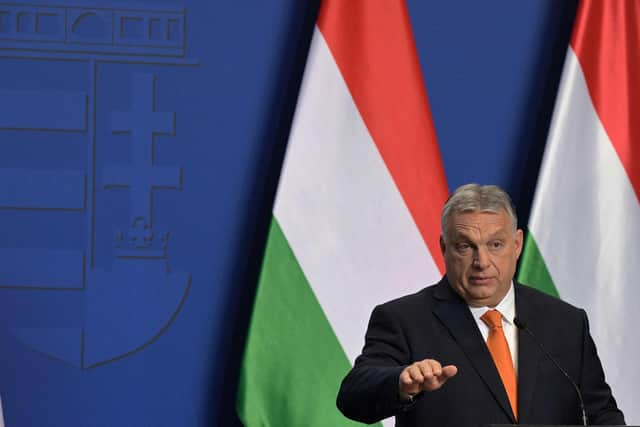Europe can only hold its values firm in the face of sneering Viktor Orban - Joyce McMillan
MacLean was born on Raasay in 1911, and spent most of his twenties and early thirties torn between the competing demands of home, family, love and war, as fascism spread across Europe.
In 1943, MacLean was invalided out of the British Army, after serving in North Africa; and that year also saw the publication of his poetry collection Dain do Eimhir, including Gaoir na h-Eòrpa, the Cry of Europe, in which he asks whether his passion for his lover can drown out the cries of suffering people across the continent. He writes, unforgettably, of “the brute and the brigand at the head of Europe”, and of “the poison of their creed”; and asks, “What is every lock of your gold-yellow head/ to all the poverty, anguish and grief/ that will come… on Europe's people?”
Advertisement
Hide AdAdvertisement
Hide AdAnd now, once again, the poverty, anguish and grief of Europe’s people devastated by war have become the daily theme of all our news bulletins, even more intensely than during the ex-Yugoslav conflict of the 1990’s. This time, the brute and the brigands dominating Europe are strongly in evidence, with Vladimir Putin’s Russia, the military giant of the continent, throwing the whole weight of its conventional weaponry against its much smaller neighbour, Ukraine, which it seeks to reclaim as part of Russia.


Nor is Putin alone; he is surrounded by an admiring culture of brutalism, and by many aspiring brutes and brigands, not only in his own country but among governments across the world. Donald Trump’s admiration for Putin, for example, is long-standing and well known, and still exerts a strong influence on the US Republican Party. Putin is seen as a vital ally against western liberalism in Beijing and Riyadh, and even by some in Delhi; he has also been courted by some in British politics, welcoming both Britain’s exit from the EU, and Boris Johnson’s rise to the premiership.
And perhaps most ominously of all, in the short term, the European Union itself, perhaps the world’s most powerful attempt to embody postwar ideals of peaceful democratic institution-building, now includes a leader - in Viktor Orban of Hungary, who scored a massive fourth election victory last weekend - who is a self-proclaimed Putin ally and admirer, both in his foreign policy, and in his methods of domestic repression.
In his victory speech, Orban sneered at those he considers his main enemies: the left in general, Brussels in particular, and even Volodymyr Zelensky, the much-admired Ukrainian president. Since his victory, Orban has also said he will meet Putin’s demand that Russian oil and gas be paid for in roubles; and that he will veto any EU-wide attempt to ban Russian oil and gas imports.
All of which raises the most profound questions about the future of our continent, in this new age of open aggression. The structure of the EU depends on consensus and negotiation within a shared commitment to a peaceful rule-governed future, and is not designed to withstand the hostile manoeuvrings of a leader like Orban, or his open hostility to the union’s founding values. In the aftermath of Orban’s victory, the Times published a robust editorial arguing that the EU has the power - and the legal backing - to remove its substantial financial support from Hungary, without delay; “a place in the family of democracies requires respect for the rule of law,” thundered the leader writer. Worse, the EU is now facing the possibility that Marine Le Pen’s increasingly popular campaign for the French presidency will be successful, creating a Putin-friendly and Euro-sceptical axis across Europe, from Budapest to the Atlantic.
If the prospects seem grim, though, it is worth remembering that they could have been worse, not least in the fact that the US administration is, for now, in the hands not of Donald Trump but of Joe Biden. That the west has often, in the past, comprehensively failed to live up to its own declared liberal and democratic values is indisputable, both in its conduct on the international stage, and in the growing indifference to rank social injustice and inequality at home that now makes its governments so vulnerable.
In this moment, though, faced with the plight of Ukraine and this new “cry of Europe”, there is nothing to be done but to support the people of Ukraine in their belief that these values matter, and are worth working and fighting for; and to use every imperfect institution we have, that claims allegiance to those principles, to try to ensure that their struggle is successful. The EU is one of those institutions; and although the loss of a France fully committed to the European project could indeed be a fatal blow, for now the EU survives, negotiates, offers moral and material support to Ukraine, ramps up economic pressure on the Putin regime, and tries - without aggressive talk of expulsions - to exert some persuasive pressure on EU members who are flagrantly flouting its rules and values.
Some will call that path “weak”, of course; and it may, to the delight of cynics and Putinists everywhere, prove too weak for these new times. Strength, though, is not always about aggression and denunciation, ramping up arms production and developing hypersonic missiles. It can be about focussing, come hell or high water, on the values of peace, security, economic sustainability and human dignity that really matter to the quality of human lives; and trying, in good times and bad, to negotiate those values into a rich and liveable reality, for the people of Europe, and of our desperately troubled world.
